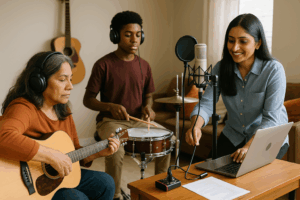As a team of active music teachers working with beginner students, we understand that preparing for a recording session is just as important as performing. Whether you’re recording at home or heading into a studio, thoughtful preparation builds confidence, efficiency, and musical clarity.
What Does Preparing Really Mean?
Recording session prep involves more than warming up. It includes planning your parts, rehearsing with intention, simulating the session environment, and coordinating with any collaborators or engineers. When applied well, preparation means less anxiety and better results.
Four Pillars of Effective Preparation
1. Pre‑Production Planning
-
Define your goals: What songs and arrangements will you record?
-
Practice key sections at home using mock setups—this helps identify tricky transitions before the real session.
-
Create a simple demo or sketch so you and your engineer are aligned on tone and structure.
2. Technical and Equipment Check
-
Ensure your instrument is well-maintained—proper tuning, fresh strings, adjusted setup.
-
If playing in a group, rehearse with click track or metronome to lock tempo.
-
Test any cables, mics, etc., to avoid technical snags in the studio.
3. Practice Like a Studio Pro
-
Record your rehearsals at home to simulate a take and review tone, timing, and articulation.
-
Practice silent start counts and consistent endings—frame each take as if recording.
-
Manage performance anxiety with repeated full takes and playback review.
4. Session-Day Logistics
-
Communicate plans and expectations clearly with your producer or engineer in advance.
-
Confirm timing, budget, and any studio protocols.
-
Arrive early to settle in, test sound, and prepare mentally.
Additional Tip on Professional Mindset
Many studio veterans say that good preparation saves both money and time in the long run—knowing what works and what doesn’t during pre-production reduces stress when the clock is ticking.
FAQ: Recording Session Prep
Q: How should beginners start preparing for a session?
A: Begin by rehearsing thoroughly, record yourself at home, and practice with metronome to simulate studio conditions.
Q: Is mocking up sessions at home really helpful?
A: Yes. Running through parts in advance helps musicians identify challenges, refine tone, and work through tempo issues before entering the studio.
Q: How do budgets influence preparation?
A: Knowing your budget shapes how much time you book in the studio. Thorough prep ensures you make the most of booked time without wasting takes.
Related Reading
Explore our blog on what beginner students can expect in early private lessons for guidance on building strong practice habits.
For detailed technical advice, the Musician’s Way by Gerald Klickstein offers excellent insights on practicing for recording.
